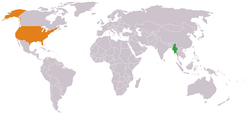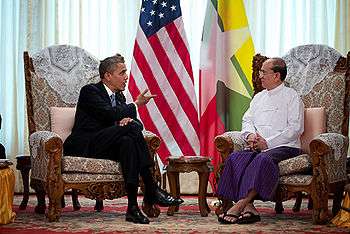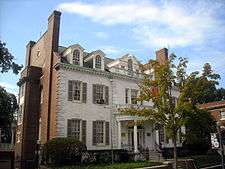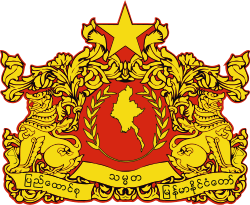Myanmar–United States relations
 |
|
Myanmar |
United States |
|---|---|
| Diplomatic Mission | |
| Burmese Embassy, Washington, D.C. | United States Embassy, Rangoon |
The political relationship between the United States and Myanmar worsened after the 1988 military coup and violent suppression of pro-democracy demonstrations. Subsequent repression, including the crackdown on peaceful protestors in September 2007, further strained the relationship. However, following signs of liberalization, the US government began the process of improving its links with Myanmar in 2011.[1] With improving ties in 2012, the White House planned Ambassador nomination, the first since 1990.[2] On June 29, 2012, the U.S. Senate confirmed Derek Mitchell as the United States Ambassador to Myanmar.[3]
In a Gallup public opinion poll conducted in 2012, 30% of Burmese people approved of U.S. leadership, with 67% uncertain and 3% disapproving.[4]
History
Massachusetts attempted to sanction Burma directly in 1996 but those efforts proved unconstitutional. Later, the United States federal government imposed broad sanctions against Burma under several different legislative and policy vehicles. The Burma Freedom and Democracy Act (BFDA), passed by Congress and signed by the President in 2003, included a ban on all imports from Burma, a ban on the export of financial services to Burma, a freeze on the assets of certain Burmese financial institutions, and extended visa restrictions on Burmese officials. Congress has renewed the BFDA annually, most recently in July 2010.[5]
Since September 27, 2007, the U.S. Department of Treasury designated 25 senior Burmese government officials as subject to an asset block under Executive Order 13310. On October 19, 2007, President George W. Bush announced a new Executive Order (E.O. 13448) which expands the authority to block assets to individuals who are responsible for human rights abuses and public corruption, as well as those who provide material and financial support to the regime.
In addition, since May 1997, the U.S. Government has prohibited new investment by U.S. persons or entities. A number of U.S. companies exited the Burma market even prior to the imposition of sanctions due to a worsening business climate and mounting criticism from human rights groups, consumers, and shareholders. The United States has also imposed countermeasures on Burma due to its inadequate measures to eliminate money laundering.
Due to its particularly severe violations of religious freedom, the United States has designated Burma a Country of Particular Concern (CPC) under the International Religious Freedom Act. Burma is also designated a Tier 3 Country in the Trafficking in Persons Report for its use of forced labour, and is subject to additional sanctions as a result. The political relationship between the United States and Burma worsened after the 1988 military coup and violent suppression of pro-democracy demonstrations. Subsequent repression, including the brutal crackdown on peaceful protestors in September 2007, further strained the relationship.
The United States downgraded its level of representation in Burma from Ambassador to Chargé d'Affaires after the government's crackdown on the democratic opposition in 1988 and its failure to honour the results of the 1990 parliamentary election.
Covert military activities in Burma
On September 10, 2007, the Burmese Government accused the CIA of assassinating a rebel Karen commander from the KNU who wanted to negotiate with the military government.[6] For background on the conflict, see
It is more fully explored on: Namebase (cross-references books on CIA activities in Burma).[7] [8][9]
According to WikiLeaks cables, the United States funded some of the civil society groups in Burma that forced the government to suspend a controversial Chinese Myitsone Dam on the Irrawaddy river.[10] According to media reports citing documents published by Germany's Der Spiegel in 2010, the Embassy of the United States in Yangon is the site of an electronic surveillance facility used to monitor telephones and communications networks, run jointly by the Central Intelligence Agency and National Security Agency group known as Special Collection Service.[11]
Recent history

US Secretary of State, Hillary Clinton, visited Burma in November–December 2011. In this visit, the first by a Secretary of State since 1955, Clinton met with the President of Burma, Thein Sein, in the capital Naypyidaw, and later met with democracy activist Aung San Suu Kyi in Yangon. The US announced a relaxation of curbs on aid and raised the possibility of an exchange of ambassadors.[1]
On the 13th of January 2012, the US Secretary of State Hillary Clinton announced the US will exchange ambassadors with Burma, after a landmark Burmese political prisoner amnesty.[12]
On Thursday, May 17, 2012, the White House Press Office announced that President Barack Obama had nominated Derek Mitchell to the U.S. Senate for confirmation to serve as U.S. Ambassador to Burma.[13][14] After being confirmed by the U.S. Senate in late June, Derek Mitchell, the first U.S ambassador to Myanmar in 22 years formally assumed his job on July 11, 2012 by presenting his credentials to President Thein Sein at the presidential mansion in the capital Naypyitaw.[15][16]
In July 2012 the United States formally eased sanctions on Burma.[17] Secretary of State Hillary Rodham Clinton announced plans in the spring of 2012 for a “targeted easing” of sanctions to allow American dollars to enter the country, but companies could not move ahead until the sanctions were formally suspended.[17] President Obama ordered in July 2012 the U.S. Treasury Department to issue two licenses, one giving special permission for investment in Burma and the other allowing financial services.[15] Although plans to lift investment restrictions were announced in May 2012, the change awaited what administration officials said were detailed reporting requirements on U.S. companies doing business in Burma, along with creating mechanisms to prevent U.S. economic ties to the powerful Burmese military and individuals and companies involved in human rights abuses.[18] President Obama also issued an executive order expanding existing sanctions against individuals who violate human rights to include those who threaten Burma’s political restructuring process.[18]
The United States will not allow investment in military entities owned by Myanmar’s armed forces or its Ministry of Defense.[19] It also bolstered its ability to place sanctions on “those who undermine the reform process, engage in human rights abuses, contribute to ethnic conflict or participate in military trade with North Korea.” The United States will continue to block businesses or individuals from making transactions with any “specially designated nationals” or businesses that they control — allowing Washington, for example, to stop money from flowing to groups disrupting the reform process. President Obama also created a new power for the government to impose “blocking sanctions” on any individual threatening peace in Myanmar. Businesses with more than $500,000 in investment in the country will need to file an annual report with the State Department, with details on workers’ rights, land acquisitions and any payments of more than $10,000 to government entities, including Myanmar’s state-owned enterprises.[17] American companies and people will be allowed to invest in the state-owned Myanma Oil and Gas Enterprise, but any investors will need to notify the State Department within 60 days. This was criticized by Human Rights Groups.[15][17][20] “The new United States government policy allowing business activity in Burma’s controversial oil sector with reporting requirements will not adequately prevent new investments from fueling abuses and undermining reform,” New York-based watchdog Human Rights Watch said in a statement.[15]“By allowing deals with Burma’s state-owned oil company, the U.S. looks like it caved to industry pressure and undercut Aung San Suu Kyi and others in Burma who are promoting government accountability,” HRW’s Business and Human Rights Director Arvind Ganesan said.[15]
In September 2016, Aung San Suu Kyi as State Counsellor of Myanmar visited United States and which has set a mile stone for the relationship between United States and Myanmar issuing a joint statement in which President Obama is lifting the Executive Order-based framework of the Myanmar sanctions while restoring Generalized System of Preferences (GSP) trade benefits to Myanmar.[21]
Diplomatic missions
The US embassy in Burma is located in Rangoon, whilst the Burmese diplomatic representation to the United States is based in Washington, D.C.
Major Officials of the US Embassy in Rangoon[22]
- Ambassador Derek Mitchell
- Deputy Chief of Mission Virginia Murray
- Political & Affairs Chief Douglas Sonnek
- Public Affairs Officer Adrienne Nutzman
- Consular Chief Andrew Webster-Main
- Management Officer Luther Lindberg
- Defence Attaché Colonel William Dickey
- Information Officer Bob Lynn
References
- 1 2 "Clinton Says U.S. Will Relax Some Curbs on Aid to Myanmar". The New York Times. 1 December 2011.
- ↑ Barta, Patrick (5 April 2012). "U.S. Forges Deeper Myanmar Ties". The Wall Street Journal.
- ↑ "Derek Mitchell confirmed as first ambassador to Myanmar in 22 years". Politico.Com. Associated Press. 2012-07-02. Retrieved 2012-11-10.
- ↑ Snapshot: U.S. Leadership Unknown in Myanmar Gallup
- ↑ Burmese Freedom and Democracy Act passed both Houses of Congress.
- ↑ "Burma Accuses CIA of Involvement in KNU Assassination"
- ↑ "CIA in Burma". NameBase. Archived from the original on 2012-01-17. Retrieved 2012-01-20.
- ↑ CIA World Factbook: Burma Archived November 4, 2010, at WebCite
- ↑ Burma, Opium and CIA: Analysis & History by Danny, UK Indymedia.
- ↑ "WikiLeaks cables: Americans funded groups that stalled Burma dam project". The Guardian. 30 September 2011. Retrieved 1 November 2013.
- ↑ Tim McLaughlin and Nyan Lynn Aung (31 October 2013). "US embassy in Yangon a secret listening post: Snowden". The Myanmar Times. Retrieved 31 October 2013.
- ↑ British Broadcasting Corporation (BBC)– US to exchange ambassadors with Burma, <http://www.bbc.co.uk/news/world-asia-16554415>. Retrieved 13 January 2012.
- ↑ WhiteHouse.gov http://www.whitehouse.gov/the-press-office/2012/05/17/statement-president-burma. Missing or empty
|title=(help) - ↑ http://www.whitehouse.gov/the-press-office/2012/05/17/presidential-nomination-sent-senate
- 1 2 3 4 5 "Derek Mitchell, 1st US ambassador to Myanmar in 22 years, presents credentials to start work". The Associated Press. Times Colonist. Retrieved 12 July 2012.
- ↑ Vandenbrink, Rachel (11 July 2012). "US to Invest in Burma's Oil". Radio Free Asia. Retrieved 12 July 2012.
- 1 2 3 4 Lowrey, Annie (11 July 2012). "U.S. Sanctions on Myanmar Formally Eased". The New York Times. Retrieved 12 July 2012.
- 1 2 DeYoung, Karen (12 July 2012). "Ban on U.S. investment in Burma is lifted". The Washington Post. Retrieved 12 July 2012.
- ↑ Calderon, Justin (21 May 2013). "Myanmar president adheres to reforms". Inside Investor. Retrieved 23 May 2013.
- ↑ McDonald, Marc (12 July 2012). "Rights Groups Assail U.S. Decision on Myanmar". The New York Times. Retrieved 14 July 2012.
- ↑ "Joint Statement".
- ↑
External links
- US State Department
-
 This article incorporates public domain material from the United States Department of State website http://www.state.gov/r/pa/ei/bgn/index.htm (Background Notes).Burma
This article incorporates public domain material from the United States Department of State website http://www.state.gov/r/pa/ei/bgn/index.htm (Background Notes).Burma - Bilateral relations

.svg.png)
